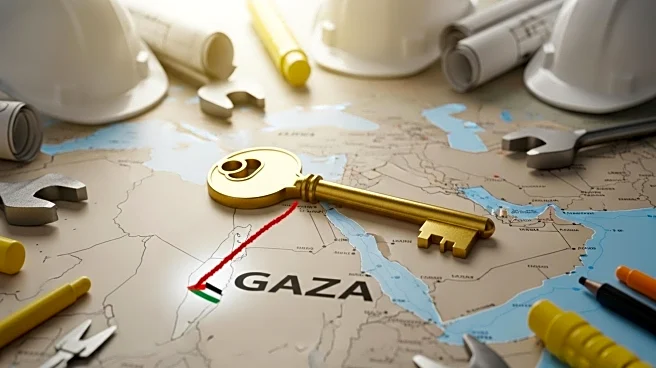What's Happening?
The White House is reportedly evaluating a proposal to offer Palestinians $5,000 to relocate for a decade while the Gaza Strip undergoes significant redevelopment. The plan, known as the Gaza Reconstitution, Economic Acceleration and Transformation (GREAT), aims to transform the region into a 'Riviera of the Middle East' as envisioned by President Trump. This initiative would establish a trusteeship to manage the 25-mile-long strip, with the U.S. overseeing reconstruction funded by billions in public and private investments. The proposal suggests voluntary relocation of Gaza's 2 million residents, offering financial incentives and housing alternatives. Additionally, digital tokens would be provided to landowners for future housing in newly developed smart cities. The plan outlines extensive infrastructure projects, including highways, ports, and resorts, with a projected return on investment after 10 years.
Why It's Important?
This proposal could significantly impact the geopolitical landscape in the Middle East, potentially altering U.S. relations with Palestinian authorities and neighboring countries. The plan's emphasis on voluntary relocation and economic incentives may face scrutiny regarding ethical implications and feasibility. If successful, the initiative could lead to substantial economic growth and modernization in Gaza, attracting international investments. However, the plan's reliance on voluntary departures and the involvement of private military contractors for security may raise concerns about human rights and sovereignty. The proposal's success hinges on cooperation from regional stakeholders, including Israel and potential investors like Saudi Arabia.
What's Next?
The proposal's progression will depend on diplomatic negotiations and securing investments from international partners. The U.S. administration may face challenges in garnering support from Palestinian leaders and addressing humanitarian concerns. If the plan advances, initial steps will involve clearing debris and rebuilding essential infrastructure. The project's long-term success will require sustained investment and collaboration with regional powers. Monitoring reactions from political leaders and civil society groups will be crucial in assessing the plan's viability and impact.
Beyond the Headlines
The ethical dimensions of incentivizing relocation and the potential for cultural shifts in Gaza warrant further examination. The plan's focus on creating smart cities and modern infrastructure could lead to long-term changes in the region's socio-economic fabric. Additionally, the involvement of private military contractors raises questions about governance and accountability. The proposal's emphasis on economic transformation may influence future U.S. foreign policy strategies in conflict zones.










